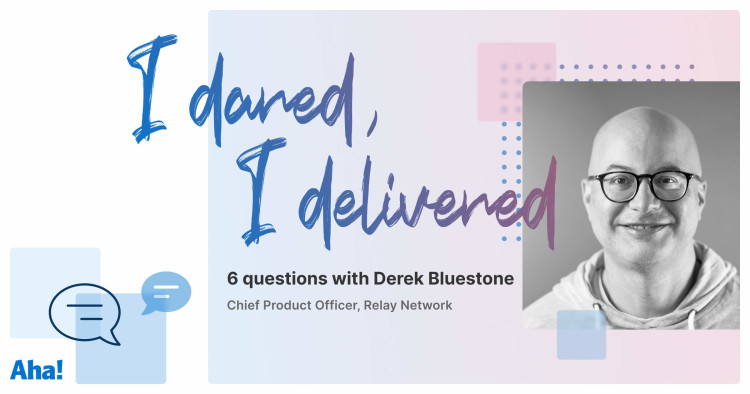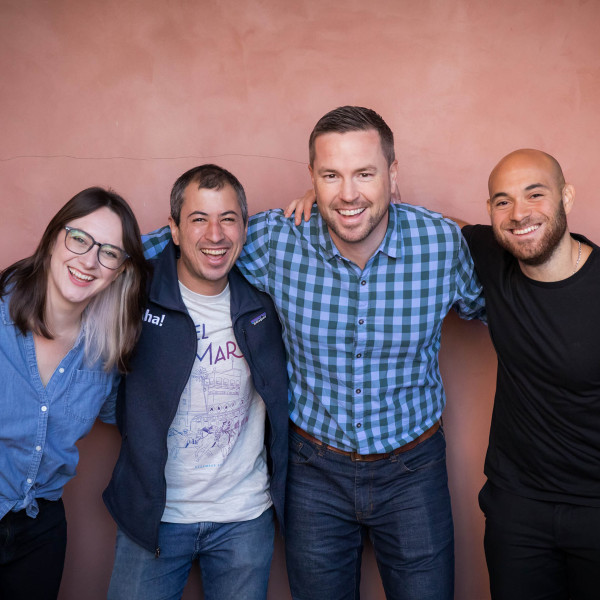
Product All-Star: 6 Questions With Derek Bluestone
Building products is an adventure. That is what makes it the best job in the world. But it is not for the faint of heart — true product success requires decisive action, continuous effort, and a relentless pursuit of value.
At Aha! we have the honor of being connected to product experts and companies who go boldly and bravely. We are asking folks to share their knowledge with you — in hopes it will inspire you in your own product career.
Derek Bluestone is the chief product officer at Relay Network. Based just outside of Philadelphia, he has 25 years of experience in product management — leading enterprise B2B software development across the technology landscape. Derek is scrum, ABCP, and PMM certified, holds three patents (with several pending), and has software architecture certifications from Carnegie Mellon's Software Engineering Institute. In his current role, Derek leads a product management and design team, helping drive meaningful engagement between brands and their customers.
Now that his kids are out of the house, Derek has taken up birding and goes fishing whenever he can. And he never misses a chance to cheer on his Philly sports teams — the Eagles, 76ers, Union, and Phillies.
What was your first product role?
"My first product role was with Fiberlink Communications in the late 1990s. We built a secure remote access VPN solution based on — wait for it — dial-up Internet access. Our clients were Fortune 1000 businesses with employees who travelled. We were able to combine the Internet points of presence (POPs) from all of the leading network carriers worldwide into a single dial-up phone book.
Later we partnered with roaming Wi-Fi providers and also offered managed security services. We grew the business from $12M to $85M in annual recurring revenue in four years. Fiberlink was later acquired by IBM."
What are the most important traits for a product builder?
"The ability to listen, collaborate, problem-solve, and communicate. Product managers need to engage constantly with customers and other key internal stakeholders.
"You have two ears and one mouth, use them in proportion."
Product managers also need to understand how enterprise software is designed and built. This requires more technical proficiency and a willingness to learn new skills. Trust is essential with your engineering and UX teammates — make sure you are constantly building bridges with them.
Don't imagine yourself at the center of the organizational chart — put the client there instead. Be open-minded and focus on finding solutions when things don't go to plan. Never point fingers. Use the correct pronouns (always "we," not me/mine/they) and be accountable. Resist the temptation to celebrate your victories, and zero in on team wins."
How do you stay motivated when complex challenges arise in product development?
"Complex and pressing business and technology challenges will always be present in our business. I draw on the strength of the relationships with my team, peers, mentors, and customers. I focus on breaking big problems down into smaller more manageable ones. I put the work down at the end of the day, leave it behind, and enjoy my personal time. The work will be there the next day."
What is the most exciting aspect of your current role?
"The best part about my job is working with very talented people to solve complex problems and deliver value."
"We are 'feed technology' pioneers. We harness the engagement power of social and news feeds for businesses and the people they serve.
To quote our founder and CEO, Matt Gillin: 'Companies have digitized so much, they’ve gotten away from the personal connection they once had with customers. Brands mean something to customers. At Relay, we’re on a mission to bring back that type of meaningful engagement.'
For me, at the end of the day, it is always about the team and the client."
What will change most about product development in the next decade?
"10 years is a long window to predict anything (beyond aging, more compliance constraints, and technical debt). I do think that product managers and leaders need to continually add technical knowledge and understand the 'how' more.
Cloud-based development platforms have changed the game. AI-informed software development will have a measurable impact on how we think about building software. However, I believe user-centered design and generative research will continue to be central to our work for the foreseeable future.
It is not an exaggeration to say that the pace of development will continue to increase — I am not convinced that this is a good thing. As product leaders and technologists, we have a moral and ethical responsibility to consider the business and societal implications of our work."
Read more of the Product All-Star series.
Know an inspiring product builder? Nominate them to be featured in an upcoming post. They simply need to be doing quality work and using Aha! software.




